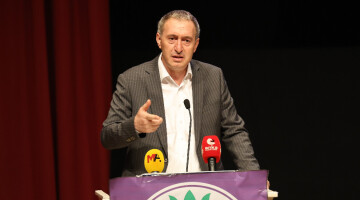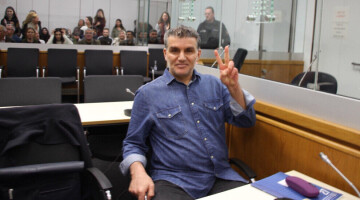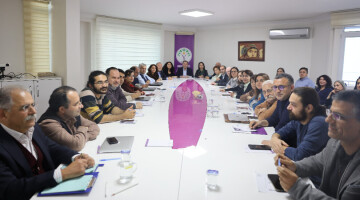The Kurdistan National Congress (KNK) is organizing a conference and a central march in Lausanne today to mark the 100th anniversary of the signing of the Treaty of Lausanne under the lead of England France, which divided Kurdistan into four parts and formed the basis for the genocidal attacks against the Kurds in the last century.
Attended by 600 guests, the two-day conference at the Beaulieu Congress Center started with a minute of silence, after which Leyla İmret and Refik Gafur from the Organising Committee greeted the guests and KNK Co-Chairs Ahmet Karamus and Zeyneb Murad spoke about the goals and objectives of the conference.
Ahmet Karamus put emphasis on the importance of the Kurdish people’s discussion of the consequences of the treaty in Lausanne after 100 years, noting that the Kurdish people have been resisting the treaty and manifested great will against its results for a hundred years. Karamus stated that a will representing the Kurdish people will be put forward at the conference.
Mayor of Lausanne: We want to open a new page with the Kurds
Speaking after, the mayor of Lausanne, Grégoire Junod, stated that the treaty signed in the city in 1923 provided the ground for great injustice against the Kurds. “We want to open a new page with the Kurds here. We want to talk about it in our city. The Kurdish people have the right to live like other peoples.”
Grégoire Junod noted that the hall where the treaty was signed a hundred years ago has been turned into a museum.
Asya Abdullah: The Treaty marks the beginning of genocides against the Kurds
PYD Co-Chair Asya Abdullah defined the Treaty of Lausanne as the beginning of the genocides against the Kurdish people, stating: “A great struggle has been waged against this treaty for a hundred years. I bow respectfully before those who led the fight and fell as martyrs in the freedom struggle of the Kurdish people.”
Referring to the fact that Kurdish women have fought and confronted occupation attacks and the international terror network ISIS on behalf of their people and humanity, Abdullah continued: “That is why the 21st century is the century of women. The century we have left behind bears historic lessons for the Kurdish people. There is resistance and struggle wherever the rights of the Kurdish people are denied. Leader Apo (Abdullah Öcalan), who is the creator of the women’s freedom philosophy and led the struggle of the Kurdish people, has been resisting the Treaty of Lausanne for 50 years. He has fought a great struggle, both for Kurdistan and the world. He has been resisting at Imralı for 25 years. His struggle is against persecution and for the rights of the peoples of Kurdistan, and for the Kurdish identity and culture. He fights for the freedom of all peoples in the region. We salute his resistance and struggle.”
Remzi Kartal: The treaty became the basis of genocides and policies against Kurds
KONGRA GEL Co-Chair Remzi Kartal noted that Kurdistan was divided into four by the Treaty of Lausanne, saying: “In the name of our people, I condemn all the countries that signed this treaty and deprived our peoples of their rights. I remember with respect and gratitude all the martyrs of Kurdistan who rose up for the Kurdish people and lost their lives in the struggle in the past hundred years. They divided our lands, tore our people apart. This treaty became the basis of the massacres and genocides perpetrated against our people in the past century. It is also the main reason for the Turkish state’s policy of monism and denial. Similarly, other countries also based on this treaty for maintaining their denial of the Kurdish people. It is the basis of all the policies directed against the Kurds. It is (the genocides of) Anfal, Halabja and Shengal. It is the Arab Belt in Rojava (Northern Syria). It is the ‘Reform Plan for the East’ in North Kurdistan (Southeastern Turkey). It is the execution of Qazi Muhammed in Rojhilat (Northwestern Iran) and the massacre of Mahabad.”
PJAK Co-Chair Siyamend Muini stated that the Kurds were subjected to both geographical and physical massacre due to the Treaty of Lausanne, which, he said, has formed the basis of genocides against the Kurdish people for a hundred years. He stressed that, in response, the Kurdish people must carry their struggle to a new level on a national basis and as one voice in all areas.
Besime Konca: Kurdish women generated social morals and a revolution
A representative of the Kurdish women’s movement in Europe, Besime Konca, pointed out that Kurdish women have protected themselves through resistance against the annihilation policies directed against the Kurdish people after the Treaty of Lausanne. Defining the Kurds as the most resilient, free and struggling people in the Middle East, Konca stated: “Kurds are still standing up against massacres on the 100th year of the treaty. This century has witnessed massacres in Dersim, Maraş and Afrin, as well as femicides, as in Iran where women were murdered in the person of Jina Mahsa Amini. Still, in defiance of all these massacres, Kurdish women are resisting under the motto ‘Jin, Jiyan, Azadi’ [Woman, Life, Freedom].
Konca added: “We have no expectations from our enemies as international powers are implementing further agreements seeking to massacre our people. We will defend ourselves relying on self-strength. I salute you in the name of the women resisting in four parts of Kurdistan. The Kurdish women have resisted and generated social morals and a revolution. With our power and determination, we will not allow policies that seek massacres against the Kurds and other peoples in the 21st century.”











